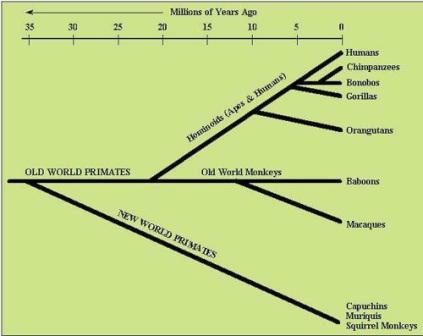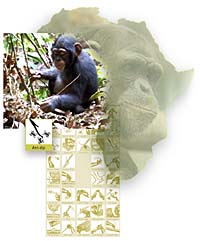12 Abr Richard Conniff, nature writer

Richard Conniff is a nature writer whose work has appeared in the Smithsonian, Atlantic Monthly, National Geographic and the New York Times Magazine. Now he has published The Ape in the Corner Office: Understanding the Workplace Beast in All of Us .
He shares insights from animal behavioralists for understanding corporate cultures. What employees have in common with penguins, tree frogs or cheetahs?
Conniff draws on wide-ranging research into multiple species and genera to address a variety of organizational factors: hierarchy, gossiping, fear, imitation ?

What follows are only a few insights, needless to say that if you feel like to read a delicious book, here you have a gorgeous opportunity.
Humans are roughly 99 percent genetically identical to chimpanzees. Hardly anyone in the business world seems to have considered what that means in our working lives.

Primate Taxonomy We, humans, belong to the same family as the anthropoid (human-like) apes, also known as the «great» apes. No other animals are as close to us: at the DNA level we are 98.4 % identical to chimpanzees and bonobos.
Often managers endeavor to minimize the human element and make companies hum like machines. Individual workers as well tend to treat human nature mainly as something to be overcome, by going in for the tummy tuck or the hair plug, by dressing for success, by giving at least the appearence of handling stress.
Firm as a Zoo.- Even Chimps spend only about 5% of their day in aggressive encounters, by contrast they devote as much as 20% of the working day to grooming family, friends even subordinates.
Human bosses, like Alpha chimps, sometimes drive their underlings beyond any resonable limits. They might do better if they understood just how far even a dumb ape will go to achieve harmony in the aftermath of a conflict.
Emotional Animals.- Shinning an evolutionary light on the workplace isn’t just a clever way to rationalize bad behavior, it is a useful approach to survival in the workplace.

W.L. Gore & Co. -?kwon as the maker of Gore-Tex ?has chosen to keep its plants and offices at what feels like a comfortable human scale ?under 200 employees. This figure is close to the maximum size of the tribal clan in which human society evolved, and some biologist say our brain are actually built to operate on this social scale. Gore employees say it feels like the right size for working together effectively.
Making faces.- There is no biological signal more reasuring than the right smile in the right place.
Smiling is our oldest and most natural expression, and like other natural expressions it evolved for a function, as a means of responding to the people around us and influencing their behaviour. In a group of macaques for instance, the approach of the alpha may cause a subordinate to cringe and nervously pull back the corners of the mouth, meaning: «I am not threat». For humans too this sort of smile is a way to disarm and ressure those around us, particularly our social superiors.
Selfish Genes Don’t Mean Selfish Behavior.- Biologist have spent much of the 40 years trying to devise a plausible explataion why baboons, or business people, would ever want to be nice, generous even altruistic with one another. They knew it happened naturally but they just could make sense of it, in the narrowest Darwinian terms.
The Capuchin Laboratory at Yerkes National Primate Research
Cooperation and Food Sharing <Video> 
One of the explanations, the handicap principle is the newest and most counterintuitive. It reckons that animals and humans engage in risky behaviours includins altruism, basically to show that they can. The bigger and bolder the display, the more status it generates. The peacok´s tail is the classic example of a handicap display.
Affiliation Instict.- There is another explanation for altruistic behaviour: we are not, after all, the rugged individualists we like to imagine. On the contrary, we tend to dwindle away on our own. People deteriorate more rapidly from heart disease, chronic stress and other disorder if they lack social support. They may have more toys, but they die younger. It is only in the context of groups and relationships tha we become fully human.
<Video> about the Capuchin Lab 
This is a discovery aging entrepreneurs tipically make when they sell the firm they have built up over a lifetime. Suddenly they relize that they are no longer alphas, but isolates.
Built to cooperate.- In a recent experiment, at Emory University, behavioral scientist used Magnetic Resonance Imaging ?MRI?to record activity in the brains of women engaged in social interactions. The women had the choice to cooperate unselfishly or to cheat (Prisoner’s Dilemma).
When players cooperated, the MRI images showed increase activity in the striatum ?-an area in the mid brain, rich in receptors for dopamine, one of the brain’s built-in-opiates natural pain relievers produced by exercise and also friendly social contacts.
Scientist have yet to replicate their results in men, and it’s possible that men’s brain are wired differently, with a more obseesive focus on social dominance than cooperation.
Nor have they tried it yet in managers. So perhaps some ambitious executive trainee is already plotting how to use the Emory study to built a career at Ralph Lauren or Wal-mart by lowering costs in Third World sweatshops. («The microchip on the sewing machine stitches up the shirt, right? So we connect it by wireless to an electrode in the operator’s striatum and that way it can stimulate the dopamine receptors?) It’s a good thing that the cost of brain surgery is prohibitive, for now.

This website gives access to an online database that
describes the cultural variations in chimpanzee behaviour
There’s also behavioral evidence to draw a hopeful Conclusion: male and female are built alike to cooperate. To be fair, to be moral, even. These tendencies may be at least as natural as selfish greed. «Morality is not a superficial thing that we added on very late evolution,» says primatologist Frans de Waal . «It relates to very old affecctionate and affiliative tendencies that we have as a species, and that we share with all sort of animals»





Sorry, the comment form is closed at this time.